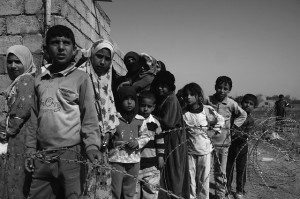With the recent string of tragedies in Brussels, Paris, San Bernardino, Orlando, and now Istanbul, the world is once again reeling from what is becoming an all too familiar cycle of violence and calls for forceful response. Yet whether the event springs from a “lone wolf” or an coordinated organizational effort, there is confusion and controversy around understanding and responding to such events.
After the initial shock and horror, there may follow an outrage that prompts a strong, even violent response. When confronted with a threat, there is a natural reptilian-brain reflex to “smash” back. Accordingly, we’ve seen increased military action in regions thought to foster terrorism, and now grapple with escalating tensions for Muslim, immigrant, and other minority populations at home.
While the Conservative response generally centers on force, the more reasoned Progressive response also tends to focus on simplistic, single-factor solutions like gun control. Though there may be little legitimate need for guns in modern society beyond law enforcement and private citizen hobbyists, does anyone believe that the only problem is the availability of weaponry? If we remove the guns, is the problem truly and entirely solved?
The psychology and geopolitics behind terrorism pose complexity of a degree that may confound current analysis and understanding. Simply succumbing to an impulse to smash it (military response) may feel emotionally gratifying in the short term, but to date has been ineffective at eliminating such occurrences. In fact, it may well exacerbate them. On the other hand, simply suppressing a symptom (private gun ownership) does not eliminate the underlying disease (the fear, weakness, and insecurity that requires augmentation with a weapon).
Who? What? How?
After the initial shock, natural questions arise: Who did this? How could it happen? What did they hope to accomplish? How can we protect ourselves in the future? Most of us cannot relate such acts to personal experience or impulse, so there is a tendency to apply labels like “insane”, “fanatical”, “barbaric”, “senseless”. Or to come up with simplistic explanations like “they hate our freedoms”. In the absence of any plausible, rational explanation, such violence ends up being dealt with as just another tragic force of nature, like hurricanes and earthquakes — a fact of life that simply must be endured and factored in to our planning.
Yet if we fail to understand such event’s originating cause, we are doomed to an endless cycle of suppressing or responding to seemingly random outbreaks of violence. It’s like fighting a fire by chasing down all the sparks without first shutting off the fuel supply.
The Why Question
Perhaps the key question, often asked but insufficiently explored, is “why?”. Why would someone be motivated to do this? Suicide bombing – why? In one sense, it is comforting to conclude that these are the senseless acts of crazed fanatics, because then we are relieved of responsibility to search further for causes, and to then consider whether our own policies and actions at home and abroad might contribute in any way to the conditions from which such acts arise.
However, despite its apparent senselessness, no volitional action is performed without some rationale. The reasoning may be misguided, delusional, poorly informed, or otherwise in error, but some sort of thought process precedes action. If we hope to understand and eliminate terrorism, this is the point at which to intervene.
So, what kind of thinking, what kind of analysis, what kind of conclusions about life and world might lead to such actions?
Are Terrorists Made or Born?
Several relevant observations came out of a 2004 Aurora Forum colloquium “Waging Peace” at Stanford University. One presenter was James Gilligan, of Harvard Med School faculty and a prison psychiatrist. Gilligan found that, after interviewing scores of inmates, a commonly expressed motivation for their violence was a need to maintain or regain “respect”. The need to avoid shame and diminution was in some cases more compelling than life itself. Interestingly, many also expressed a fantasy of “suicide by cop” – that is, to end their lives in a gun battle with police. This appears eerily resonant with the suicidal aspects of terrorism. When all other hope is lost, to go out in a noble blaze of glory may seem like redemption.
Another presenter, UC Berkeley professor emeritus Michael Nagler, described religious fundamentalism – especially as seen in the last 150 years – as being essentially “the last way-station before oblivion”. This perhaps sheds light on the desperation and fanaticism with which some cling to their ideology.
What is the basis of this fundamental need for respect or glory? At the outset of psychoanalyst Eric Fromm’s 1973 book “Anatomy of Human Destructiveness”, Fromm suggests that the most primal human drive is to make a “dent” in the world – to show that the fact of one’s existence counted for something; made a difference; that it mattered in some way that one was here. While some may then be content to carve their initials on a tree or in fresh cement, most of us would ideally like to be known, acknowledged, and remembered for doing something great. “Great” is usually thought of as something of benefit; something that leaves the world better off for our efforts. Unfortunately, failing that, it seems “great” can also mean “great evil”. (The Milton quote: “It is better to rule in Hell than to serve in Heaven.”)
Foreign Policy
If the loss of respect and dignity are prime causes of violence, one can readily see that current policies in the Middle East and elsewhere are pretty much antithetical to achieving any peaceful resolution. The philosophy and strategies exemplified by campaigns like “Shock and Awe”, “Desert Storm”, the actions in Gaza, prisons like Guantanamo and Abu Grahib, all appear intended to brutalize a people with such terrifying, overwhelming force that any spirit of resistance will be broken; whereafter they will be rendered docile and compliant for a lifetime. While this may be effective with house pets or performing circus elephants, humans generally don’t sit well with such treatment. The ethnic conflicts that rage on for decades, even centuries, make this clear.
Further, the above commonly occurs in the context of support for repressive regional leaders who will then keep a population subdued, by whatever means necessary, so that foreign interests can pursue their private agenda – mineral extraction, strategic bases and the like – without regard to the costs and harm imposed on the local population or environment.
All of the above seeds the ground for violence.
“Nothing More Dangerous Than a Man With Nothing to Lose”
Apart from issues of respect and dignity are the needs of basic survival. The practical effect of many Western interventions in the Middle East has been to destroy livelihood for vast numbers of people. Post-Saddam Iraq for example was put through a process of “de-Baathification” which saw 20,000 party members removed, several ministries with their hundreds of thousands of employees disbanded, and later, 28,000 suspected Baathist teachers fired. What did we expect these people to then do?
A recent article in The Nation magazine reported on interviews with captured ISIS fighters. One case was detailed as typical: a 26 year old man with a wife and two children had lost his ability to work. During questioning, his strong allegiance proved to be to family, his identity as a Muslim, and as an Iraqi, but not so much to the ISIS cause. His primary reasons for participating with the latter were a fear of the consequences of not participating, and the fact that he had no other means to support his family. This hardly fits the commonly promoted picture of a crazed homicidal/suicidal fanatic.
To the extent the above maxim holds true, a basic step toward reducing desperation-driven danger would be to enable – or at least not interfere with – people’s ability to create lives of personal meaning and value. In that light, I suggest true “defense” spending would entail the building of schools, hospitals, libraries, water and sewer systems, and other public infrastructure in the Third World. Give people something to “lose”. Failing that, some may continue to be tempted to make their Fromm-ian “dent” in the world through a last desperate act of violence.
Moving Beyond a Failing Strategy
If the impulsive response of violence isn’t effective at eliminating terrorism, why do we cling to it? Beyond knee-jerk reflexes or political expediency, perhaps there is a fear that, were we to fully understand the dynamics, we might have to make changes that could diminish our lives. Even in the affluent West, life nowadays often seems precarious if you’re not a member of the so-called “1%”. Any change or disruption in order to benefit others might be assumed to require personal and national sacrifice.
Such an assumption is likely based on millennia’s worth of conditioning that the world is a place of scarcity and threat, furthered by the political and economic institutions we’ve designed in response to this perception. Despite the abundance now made possible by current knowledge and technology, for the most part, the primal drives to compete, dominate, and control still seem to guide economic and governmental policy, both at home and abroad.
While the forces of competition and control have contributed much to the evolution of human culture, their shadow side is exclusion and the concentration of wealth and power. They generally lead to one or a few winners and many more losers. Most of us can accept a few losses with grace, yet when the pattern becomes too extreme, some will become hopeless and desperate – and perhaps resentful and violence-prone.
A Critical Inflection Point
With the growing turbulence internationally, growing economic inequity, growing ecological pressures, it appears we are fast approaching a crossroads for the global human culture. Do we continue on a course that inexorably concentrates wealth in the hands of a few individuals and nations (as was so well documented in Thomas Piketty’s 2013 book) or do we prefer a world of peace, stability, and opportunity for all global citizens? Does the human “best” truly come from competition and exclusion or from collaboration and the sharing of knowledge and resources?
Most cultural progressions follow an “S-Curve”: a new discovery, an accelerating increase, a longer period of stability, then a gradual slowing and eventual decline to terminus. Ideally at that critical midpoint we would make the leap to the next phase in the evolution of culture and not simply ride the old paradigm down to extinction.
Violence is not inevitable in human nature, but neither is a willingness to quietly, politely fade into oblivion when our existence is an inconvenience to others.
Ecologically and socially, it is becoming apparent that the world is one interconnected, integrated system wherein the health and the fate of one part has repercussions for others. When we fully appreciate and embrace this, and work together rather than against each other, who knows what new levels of achievement will be possible?


















